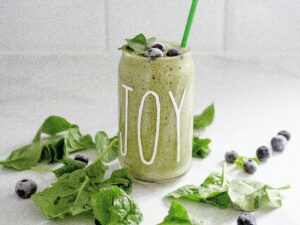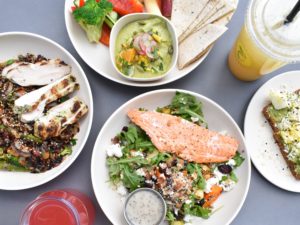Foods That Cause Chronic Inflammation and How to Fix it
Some nutrients fuel you and make you smile while others leave you in a food coma. What’s worse is that some foods can cause high inflammation which can lead to a decline in overall health. It’s time to find out what those foods are and what to eat instead.

Keep reading to find out the dangers of high inflammation, the health risks associated with it, and what foods cause this condition. Even better, find out what foods you can add to your diet to counteract the effects of these harmful nutrients.
What is Inflammation
Contrary to popular belief, inflammation is pretty normal and in some cases, it can be a good thing. Inflammation is your body’s response to injury or infection. It is a natural defense mechanism that signals to the body that damage needs to be healed. However, too much inflammation or chronic inflammation can be damaging if it goes on for too long.
Risks
High inflammation can lead to diseases such as heart disease, diabetes, Alzheimer’s disease, cancer, and more. This is because the body constantly being in a state of distress. Inflammation can even start targeting healthy tissue if it goes on for too long or can distort your immune system. This can even lead to the body attacking itself such as in arthritis.
6 Foods That Cause Chronic Inflammation
Jumping right into it, here are six foods that cause high inflammation. Plus, keep reading to find out six amazing foods you can add to your diet to come back and reduce inflammation.
1. Low Fat Foods
It sounds counterintuitive, but low-fat foods are not healthier. This is because when you remove the natural fat that occurs in products, you usually have to replace it with trash ingredients such as filler, thickeners, additives, and preservatives. In some cases, natural fat is replaced with added sugar which causes high levels of inflammation if eaten in excess.
2. Fruit Juice
Fruit juice is something everyone should avoid. Fruit juice is like drinking soda in terms of sugar content. What’s worse, fruit juice is deceptive. Even if it’s labeled as all-natural, they can still use dyes and sugar from the fruit and add it to the juice to make it look and taste better. Worst of all, fruit juice does not contain the same nutrients and vitamins that whole fruit contains. It also lacks fiber which is a beneficial nutrient that can help digestion and your gut microbiome.
3. Cooking Oils
Money cooking oils cause high inflammation. This isn’t necessarily just due to the cooking oil. Cooking oils such as canola, corn, peanut, sunflower, and safflower have high quantities of omega-6. Omega-6 oils are good for you but only when they are balanced out with omega-3 oils. Too much omega-6 is one of the leading causes of health issues in Western diets.
4. Ultra Processed Foods
\Ultra-processed foods cause inflammation for many reasons. They have a lot of ingredients in them such as trans fat, added sugar, dyes, thickeners, and other chemicals that harm your gut microbiome. This can lead to digestive issues that affect your entire health, from your metabolism to your mood. In case you didn’t know, 90% of serotonin, a happiness chemical, is created in the gut. For more information on gut health, check out this article here!
5. Refined Grain
Refined grains are overly processed grains that also contribute to chronic inflammation. These are grains such as white bread, normal pasta, and white rice. These are more simple carbohydrates that do not contain the fiber and nutrients that whole grains do.
6. High Sugar/Salt Foods
Foods that are high in sugar lead to inflammation. This is because of the effect of sugar on the body. Excess sugar leads to your body responding to inflammation. This is part of the reason why sugar when consumed in high amounts can lead to heart disease, insulin resistance, and joint problems.
Foods That Reduce Chronic Inflammation
We’ve talked about the bad, it’s time to discuss the good. Here are six foods that can fight off inflammation.
1. Olive Oil and Avocado Oil
Both olive oil and avocado oil are high in omega-3. This is a good nutrient that can help balance our dietary omega-6. This balance between omega-3 and omega-6 can lead to less inflammation.
2. Whole Grains
Whole grains contain important nutrients and high levels of fiber. Whole grains are a good way to reduce inflammation due to their reduction in inflammatory markers. They are also high in short-chain fatty acids which can help reduce chronic inflammation.
3. Leafy Greens
Leafy greens have high quantities of antioxidants which can help reduce inflammation. They are also high in vitamins a, c, and k, all of which have anti-inflammatory properties. Make your leafy greens even better for you by sauteing them in low heat with some olive oil for an extra boost of anti-inflammatory benefits.
4. Fatty Fish
Fatty fish is another great option if you want to fight off inflammation. This is because fatty fish contain high levels of omega-3. The body cannot make omega-3 fatty acids on its own, it must consume them. When you increase your consumption of these oils, you help balance the body.
5. Nuts
Nuts are another great source of healthy oils that can help reduce inflammation. They are also high in antioxidants which can help reduce oxidative stress. Oxidative stress can also lead to inflammation, which is why we need to eat foods that are high in antioxidants to combat this issue.
6. Low Sugar Fruit
Fruits that are low in sugar such as blueberries, strawberries, and cherries can be a great option if you want to fight inflammation. This is because of their high levels of antioxidants and fiber. The vitamins and minerals in these fruits also help reduce inflammation in the body.
Signs to Watch Out For
Learning to spot the difference between acute or short-term inflammation and chronic inflammation is key. If you have acute inflammation it usually occurs in a specific part of the body. You may notice pain or tenderness, swelling, temperature changes, or discoloration.
Some symptoms to watch out for if you have chronic inflammation include sleepiness, chest pain, abdominal pain, joint pain, fever, rash, depression, anxiety, gastrointestinal issues, weight loss, or frequent infections. In severe cases please contact a medical professional. While changes in your diet can help with chronic inflammation, we always want to make sure it’s not being caused by some underlying medical issue.
The Takeaway
Inflammation sucks. Chronic inflammation has been linked to a bunch of issues such as heart disease, cancer, diabetes, depression, arthritis, and many more. While it might be impossible to avoid everything that causes inflammation, we can combat inflammation by adding things to the diet that help reduce it.
Remember that health comes from within. Eat nutritious food, exercise when you can, and take care of your mental health. The small daily habits you cultivate become the basis for overall wellness. Don’t forget about microbiota health too! Gut microbiota affects the entire body, from the skin to muscles, to immune and mental health! Get all the resources you need about microbiota health for free here!





